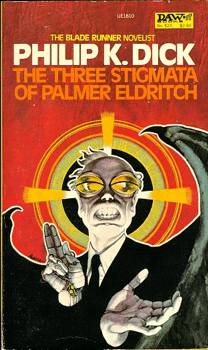Philip K Dickian
Tuesday, April 05, 2005 → by Danieru Science Fiction with its geek reputation; its furry knee-high reptilian sea creatures; its faster than light space missiles; its levitating planetary mega-dodo hyper-systems can of course be a turn off. But its that greatest of literary cliches that drives back the science fiction fanatic to their favourite genre: a deeper understanding of the human condition, in all its fetid and often mistaken glory, is the novel reader's gain. The realm of ideas is one to be relished, driven by creativity and shared with the world, so why is the single greatest vehicle for creative and philosophical theorising avoided, and quite literally the laughing stock, of so many fine Earth citizens?
Science Fiction with its geek reputation; its furry knee-high reptilian sea creatures; its faster than light space missiles; its levitating planetary mega-dodo hyper-systems can of course be a turn off. But its that greatest of literary cliches that drives back the science fiction fanatic to their favourite genre: a deeper understanding of the human condition, in all its fetid and often mistaken glory, is the novel reader's gain. The realm of ideas is one to be relished, driven by creativity and shared with the world, so why is the single greatest vehicle for creative and philosophical theorising avoided, and quite literally the laughing stock, of so many fine Earth citizens?Enter the new era of cinema. In 1982 Ridley Scott brought 'Blade Runner' to the world. A cyberpunk-esque jaunt into a future world with all the cracks, all the dark shadows of the real one. For the first time less than optimistic science fiction had found a world audience, ushering in a new era in future building. But was it really new? The movie Blade Runner was loosely based on Philip K Dick's philosophical masterpiece, 'Do Androids Dream of Electric Sheep?', written some 20 years earlier. In the novel Dick masterfully uncovers that to be human in a post utopian driven world is not necessarily to be homosapien.
After Blade Runner's success it took a further 20 years for Dick to become a well known name, and only this fine year of 2005 has Dick finally been recognised by the Science Fiction Museum and Hall of Fame. Many now concede that Dick was not just a notable sci-fi author; he was a forerunner of uber post-modern literature in a world that was not truly capable of recognising his talent until after his death.
The past few years has seen Dick's literature turned into several movies, and his ideas blatently stolen by countless others (cough cough Matrix). This spring sees the release of 'A Scanner Darkly' to the cinema screen, based on a novel motivated by the drug fuelled life Dick had lead in the late 60s. A novel which turns the paranoia of the main character into a thorough analysis of the reader's sense of self. I advise you to check out the trailer here, for it is the best looking slice of cinema I've seen in a long time.
If you want to check up on the fascinating real-life of Philip K Dick, with a paranoid, mystical wonder which often rivalled his fiction, then this Robert Crumb comic strip from the 80s is a fantastic introduction.
|
|

 Links
Links Subscribe via RSS!
Subscribe via RSS!


 Via Email
Via Email


Post a Comment